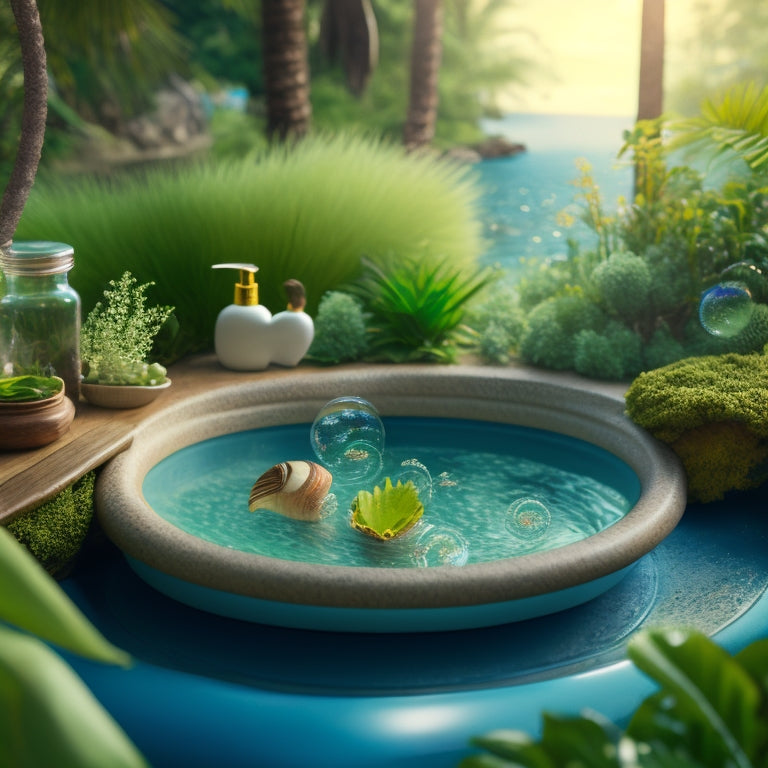
Why Biodegradable Dish Soap Matters for Earth-Conscious Homes
Share
You likely don't realize that the dish soap you're using today will still be harming the environment long after you've finished washing your dishes, but switching to a biodegradable option can make a significant difference in protecting our planet's delicate ecosystems. Traditional soaps contain harsh chemicals that contaminate waterways, harm aquatic life, and even affect your own health. Biodegradable soaps, on the other hand, break down naturally, reducing pollution and promoting skin health. By making the switch, you'll not only be protecting aquatic life and water quality but also supporting sustainable practices and human health. The impact starts here, and there's more to investigate.
Key Takeaways
- Biodegradable dish soap reduces environmental pollution by breaking down naturally, unlike traditional soaps that harm aquatic life and contaminate water sources.
- Gentle, non-toxic formulas in biodegradable soaps promote skin health, reduce irritation, and ensure food safety, contributing to personal and planetary well-being.
- Eco-friendly soaps support wildlife conservation by preserving habitats and maintaining clean water sources, essential for biodiversity and aquatic ecosystem balance.
- Biodegradable dish soap aids in maintaining soil health, enhancing fertility and water-holding capacity, and promoting sustainable agricultural practices.
- Switching to biodegradable soap is a crucial step in adopting eco-friendly living, encouraging community involvement and reducing overall carbon footprints.
Soap's Impact on Waterways
How much do you know about what happens to soap once it goes down the drain? You might be surprised to learn that it doesn't just disappear.
Soap residue can harm waterway ecosystems, affecting the delicate balance of these environments. When you wash dishes, soap residue flows into sewage systems, eventually making its way into rivers, lakes, and oceans. This residue can alter the pH levels of water, harming aquatic life and disrupting the food chain.
In fact, many eco-friendly charging stations utilize renewable energy sources to reduce their carbon footprint, and it's important to adopt similar sustainable practices in our daily lives.
Harmful Chemicals in Traditional Soaps
Your traditional dish soap likely contains a cocktail of harsh chemicals that can harm not only the environment but also your own health.
These chemicals can irritate your skin, eyes, and respiratory system, making it a risk to use them regularly. Additionally, when you wash these soaps down the drain, they can contaminate waterways, harming aquatic life and ecosystems.
Regular maintenance and inspections Electrical Connection Integrity of your home's energy systems can also help reduce energy consumption and prevent equipment failures.
The good news is that you have alternatives. Look for eco-friendly formulations that use natural ingredients and chemical alternatives that are gentler on the environment.
Biodegradable Soap's Gentle Formula
Most biodegradable dish soaps boast a gentle formula that effectively cleans your dishes without exposing you or the environment to harsh chemicals. This means you can enjoy gentle cleansing without compromising on cleanliness.
Furthermore, biodegradable soaps are designed with skin compatibility in mind, making them an excellent choice for households with sensitive skin. You won't have to worry about irritating your skin while doing the dishes.
By adopting eco-friendly practices, such as renewable energy integration, we can reduce our carbon footprint and contribute to a sustainable future. In addition, optimizing our daily routines, like streamlining logistics, can also minimize fuel consumption and lower emissions.
The gentle formula guarantees that your hands remain soft and moisturized, even after repeated washing. With biodegradable dish soap, you can have peace of mind knowing that you're not only protecting the environment but also taking care of your skin.
Protecting Aquatic Life Systems
When you wash dishes with traditional soap, you're not just rinsing away food residue - you're also sending toxic chemicals down the drain.
These chemicals can harm aquatic life, from fish to plants, and even contribute to the formation of harmful algal blooms. By switching to biodegradable dish soap, you're helping to protect aquatic life systems from these negative impacts.
Additionally, using renewable energy sources, such as green hydrogen fuel cells, can further reduce the carbon footprint of your daily habits.
With the transportation sector being a significant contributor to greenhouse gas emissions, adopting sustainable practices can have a ripple effect in promoting a cleaner environment.
Toxic Chemical Effects
Hundreds of thousands of tons of dish soap pollutants enter our waterways every year, wreaking havoc on aquatic life systems. As you wash dishes, you're unknowingly contributing to toxic exposure in our ecosystems.
The adoption of eco-friendly alternatives, such as electric vehicles reducing greenhouse gas emissions, can have a considerable impact on the environment. Conventional dish soaps contain harsh chemicals that can alter the pH balance of water, harming aquatic plants and animals.
These chemicals can also lead to the accumulation of toxins in fish and other seafood, which can then be passed on to humans who consume them. By choosing biodegradable dish soap, you're opting for chemical alternatives that break down naturally, reducing the risk of toxic exposure in our waterways.
This simple switch can considerably impact the health of our aquatic ecosystems and, ultimately, our own well-being.
Harmful Algal Blooms Form
By polluting our waterways with conventional dish soap, you're inadvertently fueling the growth of harmful algal blooms that choke aquatic life systems.
These blooms deplete oxygen, block sunlight, and release toxins, creating dead zones where aquatic life can't thrive. The main culprit is phosphorus, a common ingredient in conventional dish soap, which triggers nutrient runoff into waterways.
This excess phosphorus stimulates algal growth, leading to devastating blooms. By switching to biodegradable dish soap, you're taking an essential step in algal bloom prevention.
Biodegradable soap breaks down naturally, reducing phosphorus levels and preventing harmful algal blooms. Make the switch to protect aquatic life and preserve the delicate balance of our ecosystem.
Human Health and Soap Choices
You're likely aware that the soap you use to wash your dishes can have a significant impact on your health. The harsh chemicals in traditional dish soaps can irritate your skin, trigger allergies, and even contaminate your food.
When you choose biodegradable dish soap, you're opting for a healthier alternative. Here are some benefits to evaluate:
-
Gentle on skin: Biodegradable dish soap is typically made with sustainable ingredients that are gentle on your skin, reducing the risk of irritation and allergic reactions.
-
Non-toxic: Eco-friendly dish soap is free from harsh chemicals, ensuring your food is safe to eat and your hands are safe to wash.
-
Better for respiratory health: Biodegradable dish soap reduces the amount of volatile organic compounds (VOCs) released into the air, promoting better respiratory health.
- Peace of mind: With eco-friendly packaging and sustainable ingredients, you can feel good about your choice, knowing you're contributing to a healthier you and a healthier planet.
Environmental Benefits of Switching
When you switch to biodegradable dish soap, you're not only improving your personal health, but you're also taking an essential step towards protecting the environment.
By making this change, you'll be helping to preserve soil health, keep wildlife safe, and maintain pure water sources.
You're about to uncover the specific ways in which biodegradable dish soap contributes to a healthier planet.
Pure Water Protection
In tandem with reducing your carbon footprint, switching to biodegradable dish soap plays a significant role in protecting our planet's most precious resource: water.
By making this switch, you're contributing to water conservation efforts, which are essential for maintaining healthy ecosystems and supporting biodiversity.
Here's how biodegradable dish soap makes a difference:
-
Reduced chemical pollution: Biodegradable dish soap breaks down naturally, eliminating the risk of chemical contaminants in waterways.
-
Preserved aquatic life: Eco-friendly dish soap guarantees that aquatic plants and animals thrive in their natural habitats.
-
Protected water sources: By reducing chemical runoff, you're safeguarding the quality of our water sources, from rivers to oceans.
- Conserved water resources: Biodegradable dish soap helps minimize water waste, promoting a more sustainable future for our planet.
Soil Health Preservation
By choosing biodegradable dish soap, you're not only protecting water resources but also taking a significant step towards preserving soil health.
The harsh chemicals in traditional dish soaps can contaminate soil, disrupting its natural balance and affecting soil nutrient cycling. Biodegradable dish soap, on the other hand, breaks down naturally, allowing soil to maintain its organic matter conservation.
This is vital, as organic matter is essential for soil's water-holding capacity, aeration, and fertility. By preserving soil health, you're supporting a thriving ecosystem that can sustain life.
Wildlife Safety Net
Switching to biodegradable dish soap creates a wildlife safety net, shielding aquatic life from the toxic effects of traditional soaps that can contaminate waterways.
When you make this switch, you're contributing to wildlife conservation by choosing eco-friendly ingredients that don't harm the environment.
Here's how you're making a difference:
-
Reduced toxicity: Biodegradable dish soap breaks down naturally, reducing the amount of toxic chemicals in waterways.
-
Protected habitats: By keeping waterways clean, you're preserving habitats for aquatic life to thrive.
-
Conserved ecosystems: Eco-friendly ingredients help maintain the balance of ecosystems, ensuring a healthier planet.
- Increased biodiversity: When waterways are free from pollutants, biodiversity increases, supporting a wider range of plant and animal species.
Breaking Down Biodegradable Soap
When you pour biodegradable dish soap into the water, its unique molecular structure springs into action, allowing it to break down quickly and easily.
This process is made possible by the biodegradable ingredients that make up the soap. These eco-friendly alternatives are designed to disintegrate naturally, reducing their impact on the environment.
Unlike traditional soaps that can persist in the ecosystem for years, biodegradable soap breaks down into carbon dioxide, water, and biomass within a matter of days.
This rapid decomposition prevents harm to aquatic life and minimizes the risk of environmental pollution.
Sustainable Cleaning for the Future
As you scrub away at those pesky dishes, you're not just cleaning your kitchen - you're contributing to a larger movement. You're part of a growing community that's choosing eco-friendly alternatives and sustainable ingredients to reduce their environmental impact.
By making conscious choices, you're laying the groundwork for a cleaner, greener future.
Here are 4 ways you can continue to make a difference:
- Opt for refillable containers: Reduce single-use plastics and choose dish soap brands that offer refill options.
- Choose plant-based formulas: Look for soaps made with natural, biodegradable ingredients that are gentle on the environment.
- Support eco-certified brands: Keep an eye out for certifications like EcoLogo or Safer Choice, which guarantee the product meets rigorous environmental standards.
- Spread the word: Share your sustainable cleaning habits with friends and family, inspiring others to join the movement.
Frequently Asked Questions
Can I Use Biodegradable Dish Soap in My Dishwasher?
You can use biodegradable dish soap in your dishwasher, but check the soap's formulation and manufacturer's instructions first, as not all brands are compatible with dishwasher use, and some may require special settings.
Are Biodegradable Soaps as Effective as Traditional Ones?
You're wondering if biodegradable soaps are as effective as traditional ones? Rest assured, they're just as good at cleaning, and their gentler formulas even benefit your skin and the environment, making them a win-win for effectiveness and environmental impact.
Can I Make My Own Biodegradable Dish Soap at Home?
You can easily make your own biodegradable dish soap at home using DIY ingredients like coconut oil, washing soda, and natural alternatives like lemon juice and vinegar, allowing you to customize and control the eco-friendliness of your cleaning products.
Are All Eco-Friendly Soaps Automatically Biodegradable?
Sifting through soap shelves, you'll find that not all eco-friendly soaps are automatically biodegradable; look for biodegradable certifications and eco-friendly ingredients, ensuring the soap you choose is gentle on the planet, not just your hands.
Do Biodegradable Soaps Expire or Have a Shorter Shelf Life?
You're wondering if biodegradable soaps expire or have a shorter shelf life? Generally, they don't expire, but their ingredient stability affects shelf life; some biodegradable soaps may lose potency over time, so it is crucial to check the manufacturer's guidelines for best use.
Related Posts
-

7 Best Geothermal Cooling Systems for Hot Climate Homes
You're evaluating geothermal cooling systems for your hot climate home, and you want to know the top options. Look fo...
-

5 Efficient Air Circulation Methods for Green Homes
You can utilize the power of natural ventilation techniques, whole house fans, and solar-powered ventilation systems ...
-

10 Best Sustainable Waste Management Solutions for Green Homes
You're likely unaware that the average green home generates over 2 kilograms of waste daily, but with the right susta...


